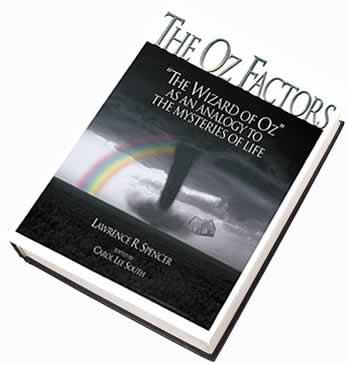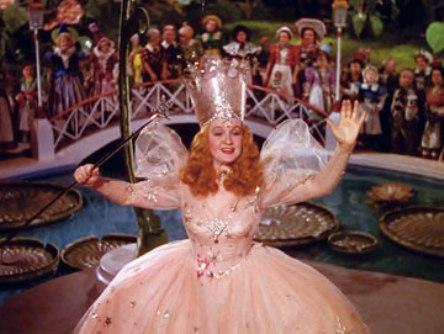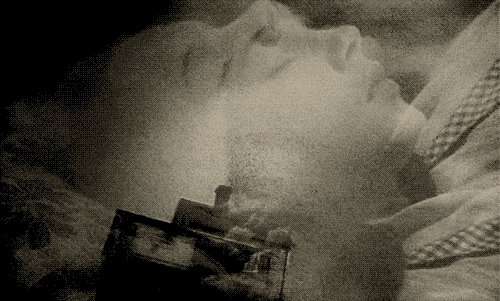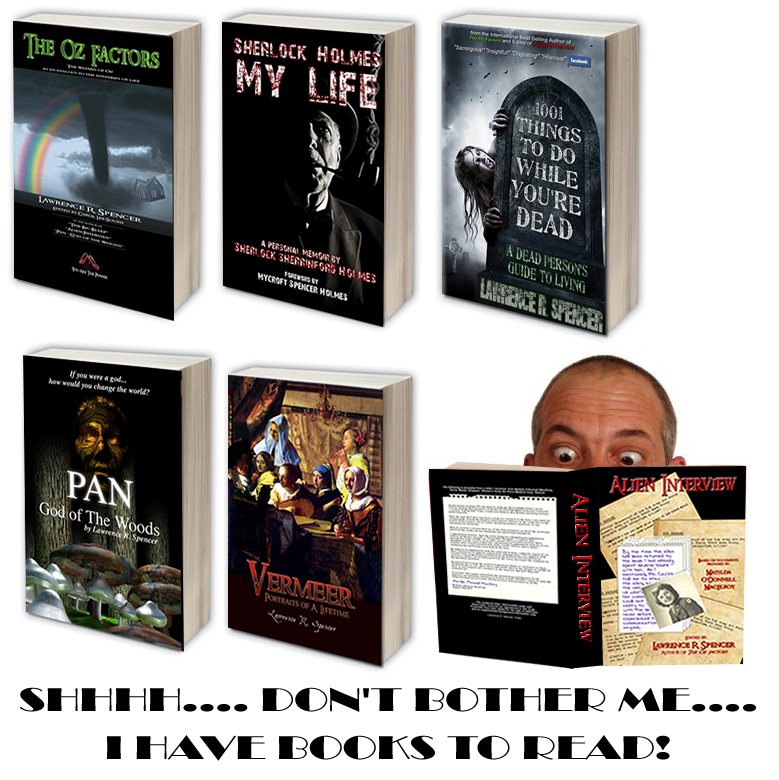Republished by Blog Post Promoter
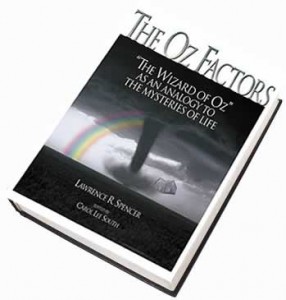
An Excerpt from Chapter 5 of the book “THE OZ FACTORS” by Lawrence R. Spencer
THE LOGIC OF FLYING MONKEYS
“Silence, whippersnapper! The beneficent Oz has every intention of granting your requests. But first you must prove yourselves worthy by performing a very small task. Bring me the broomstick of the Witch of the West!”–The Great and Powerful Oz in ‘The Wizard of Oz’
“But if we do that, we’ll have to kill her to get it … “–The Tin Man
“Bring me her broomstick and I’ll grant your requests! Now, go!”–The Great and Powerful Oz
“But what if she kills us first?”–The Lion
“I said GO!”–The Great and Powerful Oz
A–REMEMBER THE RUBY SLIPPERS!
The admonition Glinda gives to Dorothy about the Ruby Slippers is worth remembering: “Remember, never let those Ruby slippers off your feet for a moment, or you’ll be at the mercy of the Wicked Witch of the West.”
Wicked Witches are an obvious source of danger, but how about the “great and powerful” leaders who are supposed to guide and protect us? How often have such men proven to be good leaders? What kind of “Ruby Slippers” do we have in real life to protect ourselves from the Great and Powerful Oz?
Dorothy and her friends, like most of the people of planet Earth, wish there were an Emerald City with a wise and wonderful wizard to care for and protect them behind the safe and secure walls where everyone enjoys opulent prosperity and lives happily ever after.
As they run across the poppy field toward the Emerald City, a chorus of angelic voices sings of the promise of a utopian life beyond the glistening green gates:
“You’re out of the woods, you’re out of the dark, you’re out of the night. Step into the sun, step into the light. Keep straight ahead for the most glorious rays on the face of the Earth or the stars. Hold on to your breath, hold on to your heart, hold on to your hope. March up to the gate and let it open … ”
If these promises were true, the Emerald City would be Utopia and its leader might be called a “benevolent dictator”. What’s so great about a benevolent dictator?
A political leader or god, theoretically, is supposed to be a wise, powerful and caring father figure with no vested interest other than to protect and propagate the highest, most survival interests of the people under his care. This leader’s job would minimally include:
1/ Defense of the people against enemy attacks with minimal destruction to their homeland.
2/ Justice, fairly administered.
3/ Order maintained throughout the land.
4/ Prosperity, longevity and peace as the routine state of affairs.
5/ Natural resources managed to benefit the greatest good for the greatest number of beings, which would include ALL life forms.
6/ Crime punished and production rewarded.
With such a ruler, a sparkling, majestic, Emerald City full of happy, productive beings, who really could sing, “that’s how we laugh the day away in the merry old Land of Oz,” might actually be possible.
However, the Wizard of Oz is not a benevolent dictator after all. As we finally learn at the end of the movie, the closest thing to a benevolent dictator in the Land of Oz is Glinda, the Good Witch of the North, who is a tough defender of the Munchkins against the evil antics of the Wicked Witch sisters.
Glinda is what every Earthling could ever hope for in a leader. She is impervious to attack. She handles the threats against Dorothy from the Wicked Witch of the West with a curt, “Oh, rubbish! You have no power here! Be gone, before someone drops a house on you, too!” And, she saves Dorothy from the inept balloon bumbling of the Wizard of Oz who betrays his promise to get her safely back to Kansas.
Glinda, the ever-watchful guardian, is always there when there is trouble, floating in and out in her flying bubble, breaking the evil spells of the Wicked Witch with an impromptu snowstorm.
Glinda is always cheerful, never has a hair out of place and seems to have a workable solution for every problem.
In the end, it is Glinda who finally guides Dorothy back to Kansas with just the right balance of insightful prompting, allowing Dorothy to use her own ability to create her own universe. In short, Glinda is the perfect leader.
However, much to our dismay and disappointment, the political scam of Professor Marvel, who masquerades as a “Wizard” in Oz, is much more typical of the kind of devious and incompetent rulers we have on Earth.
B–GREEN-COLORED GLASSES MAKE THE POWERFUL LOOK GREAT
“I am Oz, the great and powerful! Who are you?”–The Wizard in ‘The Wizard of Oz’
“If you please, I am Dorothy, the small and meek.”–Dorothy
“SILENCE!”–The Wizard
In the original book by L Frank Baum, ‘The Wonderful Wizard of Oz’, the Wizard created the illusion of Emerald City with a stupid trick–he simply gave all the native inhabitants a pair of glasses with green-colored lenses! One would think that the citizens of this Emerald City would laugh at such an absurd control tactic and just throw the bum out. After all, they were getting along quite well before the Wizard ever showed up!
The sad situation in the real world, is that so many people voluntarily wear green-colored glasses and agree that everything they see is rosy!
It could be said that we create the government we get.
The history of Earth is littered with the ruins of civilizations that never achieved anywhere near a Utopian existence and were devastated for want of benevolent leaders like Glinda. There have certainly been enough dictators, but most of them have been nothing more than self-serving, thieving, war-mongering maniacs.
The most glorified and venerated leaders in history are often those who have been the least benevolent and the most destructive to life, property and sanity.
As with all politicians, Dorothy and her traveling buddies find out too late that the Wizard has been grossly misrepresented as a trustworthy leader. He can’t deliver on the promises he makes, so in order to save himself from political scandal he sends Dorothy off to do battle with the enemies of the Emerald City: the Wicked Witch and her Flying Monkey minions. He puts up a clever facade of political slogans, threats, rhetoric, costumes and technical trickery to cover his own cowardice and incompetence. He even keeps his balloon hidden nearby so he can make a quick getaway when the Wicked Witch shows up. He’s just another bombastic, political, side-show huckster from Kansas looking for a free ride on the backs of the citizens of Emerald City. He behaves in much the same way as many Earth politicians and militarists who, by birth, bribery or back-stabbing, have gained positions of power throughout our less than glorious history.
Why does it take a dog like Toto to pull back the all-too-obvious curtain of pretense behind which political and military leaders hide?
Being a dog, Toto can smell the cowardly Wizard behind the curtain. But more importantly, he is free of the vested interests that make humans vulnerable to politicians.
The same old, timeworn Yellow Brick Road has been trod by nearly every “leader” in the battered history of planet Earth. Taxation, slavery, “voluntary donations” and other forms of legalized theft have been the stock in trade of politicians and priests throughout the ages. Of course, all of this financial coercion is made possible through the use, or threat, of military force.
What keeps humankind from banding together to overthrow, or to just simply ignore, the perpetual scam of politics?
Perhaps, like the “lobster syndrome”, the condition does not improve because people are too busy dragging each other down into the boiling caldron of economic necessity. They do not have enough time or attention to notice that they are all about to be cooked alive and eaten up by the politicians who got them into the hot water in the first place! (Not to mention the bankers who own the fuel, the stove, the cooking pots and the water!)
Thousands of years of such insanity has convinced us that politics and military coercion are the normal way of life. Consequently, Homo sapiens logic has long dictated that the use of force is the only guarantee of survival. Brawn is better than brains! Wisdom is for wimps! Might makes right!
The use of force, however, usually has two nasty side effects, among others: death and destruction.
1/ SEEING REASON
“Oh, please give me back my dog!”–Dorothy
“Certainly–certainly–when you give me those slippers.”–The Wicked Witch
“But the Good Witch of the North told me not to.”–Dorothy
“Very well. Throw that basket in the river and drown him.”–The Wicked Witch
“No! No! No! Here, you can have your old slippers–but give me Toto!”–Dorothy
“That’s a good little girl. I knew you’d see reason!”–The Wicked Witch in ‘The Wizard of Oz’
The Logic of Force mandates that “seeing reason” is the same as “knowing what’s good for you”. When one relies on the use of force, rather than wisdom, quantity is more important than quality. Bigger is Better. Big Business. Big Guns. Big Tits. Big Box Office. The physical universe is viewed as something to be conquered by force. The only god worth worshipping is gold. The only goal worth achieving is the accumulation of gold, strength and power. The Yellow Brick Road, we are indoctrinated to believe from birth, is paved with gold. Yet, when we die, we can’t take it with us.
Supposedly, the god or gods in the afterlife do not judge you by how much gold you have. However, the priests of Earth, who want you to think that they intercede with the god(s) on your behalf, will judge you according to how much of your gold you give to them!
The heroes of civilization, at least in the eyes of historians, are the men who most exemplify the “logic of force”.
The traditional role of the politicians of Earth is exemplified by the song the Cowardly Lion sings: “If I were King of the Forest, not queen, not duke, not prince, my regal robes of the forest would be satin: not cotton, not chintz. I’d command each thing, be it fish or fowl, with a woof and a woof, and a royal growl. As I click my heels all the trees would kneel and the mountains bow and the bulls cow-tow and the sparrow would take wing. If I, if I, were King. Each rabbit would show respect to me, the chipmunks genuflect to me. Then my tail would lash, I would show compash for every underling! If I, if I were King, just King.”
Regal robes, indeed! The Lion won’t settle for fabric of the peasantry. He doesn’t want cotton or chintz–he wants satin! And he wants red velvet carpeting rolled out in front of him and a golden crown placed on his head. And of course, a jewel-studded scepter! But, most of all, he wants homage and subjugation from his underlings.
It’s a canned formula from one historical period to the next. Earth is strewn with the ruins of artfully sculpted architectural monuments, statuary and tombs that have been built and dedicated by some self-aggrandizing warrior-politician. Politicians or warrior-kings enlist the aid of the best artists, poets, architects, songwriters and performers that taxes and plunder can buy to spell out G-L-O-R-Y for themselves.
Politicians convince people to buy propaganda campaigns for self-serving vested interests using aesthetics to cover up the grim, dismal truth: they are sending the peasants off to kill and steal from each other so they (the politicians) can make a profit for themselves from the plunder. Just like the Wizard of Oz sending Dorothy on a quest to bring back the broomstick of the Wicked Witch. He didn’t have the guts to go and get it himself!
Like Professor Marvel posing as the Great and Powerful Oz, many of the most famous leaders in history hid themselves behind a curtain of aesthetic lies. When Toto pulls back the curtain, what kind of man hides behind the illusion?”
 To go “Down The Rabbit Hole“ is to enter a period of chaos or confusion. The expression is an allusion to Lewis Carroll’s Alice in Wonderland, published in 1865.
To go “Down The Rabbit Hole“ is to enter a period of chaos or confusion. The expression is an allusion to Lewis Carroll’s Alice in Wonderland, published in 1865.
